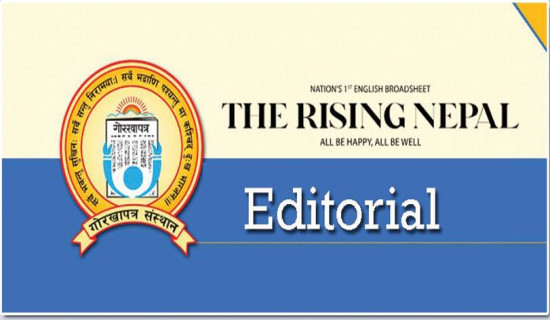- Saturday, 24 January 2026
Nepal’s Climate Call
Climate change is arguably the biggest existential threat humanity and other living beings inhabiting the earth have ever faced. Anthropogenic activities such as burning of coal and other fossil fuels as a source of energy – that releases greenhouse gases into the atmosphere – to power industrialisation and luxury lifestyle mainly in now-developed and rapidly developing countries have been the major factors driving climate change. The more greenhouse gases in the atmosphere, the quicker and severer the climate change. Global warming and changing weather patterns are its striking features.
But, unjustifiably, those disproportionately affected by it are not the ones largely responsible for it, but the poor and least developed countries (LDCs), Land Locked Developing Countries (LLDC) and Small Island Developing States (SIDS) that have negligible roles, if at all. One such unfairly impacted country is Nepal, where ravages of climate change is seen everywhere – from rapidly melting of snow in the Himalayan glaciers to growing heat waves, drought and other extreme climatic events in frequency and duration – and its ramifications endured by people in every pocket of the country.
It is exactly these issues concerning the horrendous impacts and the international support to these countries as a climate justice and a coping measure that Prime Minister KP Sharma Oli underscored recently as he delivered his key speech at the 79th Session of the United Nations General Assembly (UNGA) being held in New York, the USA. Calling for substantial reform of the global financial system as described by UN Secretary-General Antonio Guterres as "morally bankrupt", the Prime Minister also articulated the urgent need for adequate climate financing including 'Loss and Damage' fund to support climate-resilient measures and infrastructure for adaptation in the vulnerable countries.
He told the world leaders that the impacts of Nepal's rapidly losing its pristine glaciers extend beyond its borders to millions of inhabitants living downstream in the form of acute scarcity of water supply, loss of biodiversity, among others. As poor countries navigate through the climate crisis of tall order, they are having to divert the budget to cope with the devastating floods, landslides or heat waves, among other extreme events, diminishing their earmarked budget for human and other developments as well as building resilient infrastructure. It is this shortfall that the climate justice fund should cover.
Besides, the speech also dwelled on technology. Referring to technology as double-edged sword, he called for transfer of cutting edge technology to poorer world from rich world so that the former could catch up with the latter in many development fronts and save themselves from the risk of being left behind. His firm belief that humankind is still capable enough to march ahead without compromising the prosperity and happiness of future generations strongly resonated with us. The world has already witnessed the success stories of human efforts in tackling the problems of acid rain and depletion of ozone layers. There is no reason climate change cannot be addressed with bold action.
As such, like the PM said, there's still optimism in the air that we can mitigate the climate change issue to bearable level. The tremendous growth of renewables and meteoric rise of electric vehicles (EVs) are the bright spots. What's more, the PM's speech touching on other global and national issues that really matters – from international peace, multilateralism, ending of cross-border hostilities for lasting peace to Nepal's unwavering commitment to transitional justice – shows the country truly cares for global peace and is eager to do its bit to that end.














-original-thumb.jpg)


